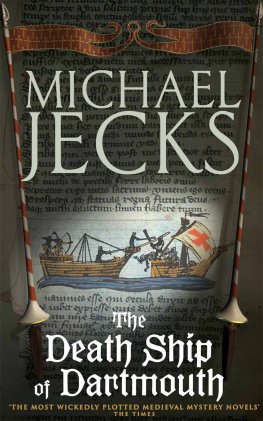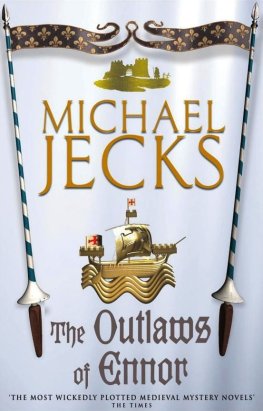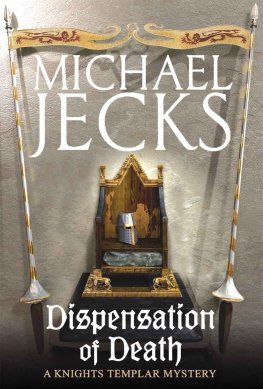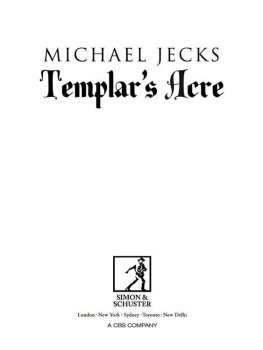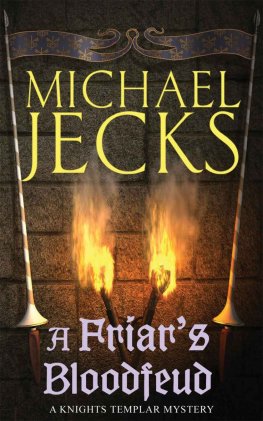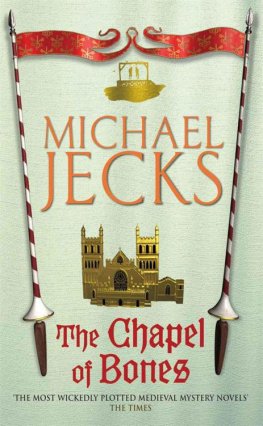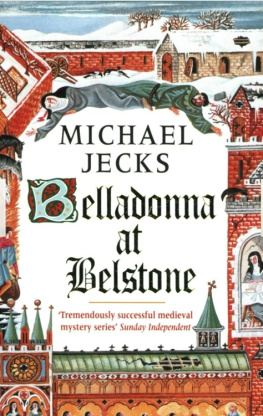Michael Jecks
THE BOY-BISHOP'S GLOVEMAKER
2000
For Spike, Cathy, Jordan and Kristen, because without their help (and printer) Id never have got started.
Its also for Fred Storm, the Blues Brother who lives on.
Acknowledgements
I have to thank too many people for their help in researching this book for me to be able to list them all, but some stand out for their specific assistance:
My wife Jane, who patiently proofread this like so many of my other books, and pointed out all the little details Id missed.
Margaret Cash, who has helped me greatly with this work. I have her to thank for the translation (from Latin) of Grandissons Regulations for the Boy-Bishop.
The librarians at the Devon and Exeter Institution, who scratched their heads doubtfully when I asked about ancient maps, ancient pictures, ancient names, and especially, ancient ceremonies. Yet each time they were able to recall specific documents or books, and if they couldnt give me the references directly, they always managed to point me in the direction of the authors or works which could.
The people of North Dartmoor who have gone out of their way to make my research fun, who have given me fresh ideas for my stories, and who still take me to see new places where horrible things could have happened!
Annuellar
Sometimes also called Annivellars in Exeter, these were the priests who served the Chantries. They were appointed by the Dean and Chapter of the Cathedral to service a specific Chantry and to participate in the choral services along with other minor clergy. Annuellars were paid by an annual stipend and lived alone in rented chambers in the Close. They were paid some 24 each year, from which they had to pay rent and buy their own food. Some had private means.
Canon
There were twenty-four Canons in Exeter, men who had chosen to live together bound by the Churchs rules. They controlled the income of the Cathedral in common and mostly lived in the Close in their own houses. The more senior Canons were also expected to look after a Secondary and a Chorister, providing them with meals and offering other patronage.
Chantry
A popular way for people to protect their souls was to found a Chantry. This was a Mass held at set times or days to pray for the founders soul. The Mass itself was the Chantry, although prayers for members of the founders family were sometimes added. Chantries could be expensive since they often involved funding an altar, chapel, or part of a church, as well as sufficient money to pay for priests to service it. Exeter had many such Chantries.
Chapter
Exeter Cathedral had a large Chapter comprising twenty-four Canons. This body was ruled by the Dignitories. Among the Canons were the Archbishops of Barnstaple, Cornwall, Exeter and Totnes. Only the Dignitories possessed separate endowments.
Choir
The full body of men who served the Cathedral, comprising the Chapter and the Minor Clergy. However, the area of the Cathedral in which their stalls were placed was also termed the choir of the church.
Choristers
To assist with the singing there were fourteen Choristers, who were appointed by the Precentor and held their posts until their voices broke.
Custors
These were the custodians of the buildings, furnishings and gates. In the Cathedral, four Custors looked after lights, ornaments and vestments under the supervision of a sub-Treasurer. Similarly other Custors rang the bells and kept order.
Dignitories
This was the ruling body of the Cathedral. It comprised the Treasurer, Chancellor, Precentor and, at the head, the Dean.
Minor Clergy
There were four groups which are lumped together as Minor Clergy: the Vicars Choral, the Secondaries, the Choristers and the Annuellars. During the early 1300s there were some twenty-four Vicars, twelve Secondaries and fourteen Choristers. The Minor Clergy had a pleasant, sociable life. They had more personal freedom than a monk or friar, not to mention the potential for enjoying the varied amusements available in a city.
Minor Officers
Many of the routine tasks were undertaken by independent clergy with no other employment. They included the Custors, various administrative clerks, the Bailiff of the City, who collected rents, and the Succentor.
Punctators
These behaved like school prefects, noting down who had (or rather had not) attended services. The Vicars, Annuellars and Secondaries were supposed to attend all services unless ill, on pilgrimage, or granted special leave of absence, and Punctators kept records, checking off those who arrived against their lists.
Rulers
At special ceremonies, those which the Canons couldnt be expected to remember since they only happened once a year, Rulers would be positioned in front of the choir on revolving stools. They would prompt the choir, singing the first notes of each part of the service to remind the rest of the order of service.
Secondaries
These were appointed by the Dean himself. Generally they were adolescents and youths aged between seventeen and twenty-four. Several were admitted at puberty because they were Choristers whose voices had broken. Sadly it seems that many failed to gain higher offices and remained tonsured clerks or acolytes in order to keep open the opportunity of some form of career in their adulthood.
Succentor
This man was responsible for the music and the rituals within the Cathedral. He controlled which songs and prayers would be used.
Vicars Choral
Originally the Vicars were personal servants for the Canons, and thus there were twenty-four, one to match each Canon. Each was appointed by his own Canon, to whom he rendered personal services in exchange for benefits. He had lodgings in the Canons house, meals at his table, and accompanied his Canon to the Cathedral. In 1300 they were paid some 23 per annum in cash, but of course lived with free board and lodging.
The Regulations for the Boy-Bishop at Exeter
Cathedral after Bishop Grandisson c. 1330
(translated from the Latin by Margaret Cash)
To the Mayor and Commonality of the City of Exeter
1. No wine or cake should be made available on the eve of St Thomas the Apostle at Kalandarhay.
2. No breakfast shall be made on the Feast Day of St Thomas the Apostle in the room of the Chorister-Bishop, but the Bishop together with the Choristers and servants of the Canons at the house of their master, as they are accustomed on other days.
3. Distribution of gloves within the Close shall be done by two or three of the Choir, and in the city and its vicinity by two, three or four from the servants of the Canons of the Master Bishop, according to the discretion of the said master.
4. The Bishop shall give no regard to his brother Choristers on Holy Innocents Day.
5. None shall be called to lunch on Holy Innocents Day, at the expense of the Bishop, at the house of his master, unless they be special friends of the said Bishop, and then not beyond the number of six persons. The Bishop shall pay to his Canon master, should he wish to receive it, four pence for whatever lunch is taken. And the Bishop shall consider himself content with his masters service.
6. On Holy Innocents Day there shall be prepared and arranged a pennyweight of bread, a pottle with a narrow neck, and two or three pennyweights of meat or one of cheese and butter, to be carried to the Bishops room and carried by the Bishop and his brother Choristers, and he shall go down to the Priory of St Nicholas, provided that the expense of the said breakfast shall not exceed the sum of four or six pennies.


